- Home
- Roxane Gay
An Untamed State Page 28
An Untamed State Read online
Page 28
“Don’t touch me,” I whispered.
Michael nodded.
I kissed his chin and drew my lips along the line of his jaw. “Please don’t touch me,” I whispered again.
“You’re safe with me,” he said. “I will not touch you.”
“I need to tell you what happened before you decide if you will stay. Do you want to know?”
“I do,” Michael whispered.
I ran my fingers through his hair, trying to memorize each strand. I kissed him, reminded my mouth of his taste. At first our lips were soft together and then they weren’t and I wanted to fall into him as much as I wanted to pull away. I needed Michael to know I still belonged to him and only him, no one else, not ever.
I pressed my chest against his, my cheek against his neck, my lips barely brushing his ear. There were many truths to share. Softly, softly, I told Michael the best truth I could, the one we could both live with so he could someday be freed of whatever he imagined about those thirteen days, so I might someday be freed of the truest truth.
I spent nearly six months with Lorraine and Glen, who watched over me the way my own parents should have watched over me. Michael visited when he could. Mona sometimes came with him and chattered endlessly about how quaint it was in the country, about Carlito and what he was up to, about all the things we would do when I returned to Miami. She and Lorraine got along famously. Mona never tried to make me talk about what happened. She did not push. She was just there. Sometimes, Michael left Christophe with me; sometimes, he didn’t—it depended on if I was closer to dead or alive. I spent a lot of time alone, locked inside myself, while the people who loved me most tried to reach me.
I did only one interview, for an evening news program, with a journalist I hoped would not ask me stupid questions. She mostly didn’t. There were no other interviews, no books, though someone made an unauthorized movie that airs regularly on a cable network. People love a real tragedy when they think it cannot happen to them. At the end of the movie, in white block letters, the epilogue reads, “Mireille Jameson practices law and lives in Miami, Florida, with her husband and son.” I have seen the movie more times than anyone knows. It comforts me to imagine my kidnapping had been that neatly endured and resolved.
Five years later, I had seen several therapists. Some sent me to psychiatrists who tried to fix me with complex cocktails of drugs with very long names I cannot pronounce, drugs that made me listless and tired, always so tired, unable to think or work or be a wife or mother. Others told me I simply needed to talk, as if all it would take was the recitation of my horrors for my anger and my grief and my terror to disappear. Only one therapist told me the truth. She sat in one of those expensive, uncomfortable chairs you see in modern design magazines. She set her leather-bound notebook on her desk and leaned forward, her elbows on her knees. She said, “I am going to come clean with you, Mireille. You will get better but you will never be okay, not in the way you once were. There is no being okay after what you’ve been through.”
That truth freed me. I said, “Thank you,” and I meant it. I was lighter and cleaner and calm. I still see her once a week, sometimes twice. Sometimes Michael and I go together. I never say much but I show up.
We tried, unsuccessfully, to have another child. We spent a shocking amount of money and saw specialists across two continents but carrying a child was something my body was no longer capable of. No amount of reconstructive surgery or time or money or hope would fix what was damaged. The sorrows piled themselves silently around us, nearly choking us, choking me. But. We eventually found a surrogate to carry our baby, a little girl. She is a beautiful creature with wide eyes and scrawny, bowed legs. Lorraine says, with so much pride, that our daughter is advanced even though she’s not yet two. We named the baby Emma Lorraine and like Christophe, I rarely let her out of my sight but not in a way that would make her helpless or weak. Girl children are not safe in a world where there are men. They need to learn to be strong.
There was an earthquake. Haiti split open and all that remained were gray piles of rubble and hundreds of thousands of people with nothing to hold them to the world, living in tents hungry, hungering and somehow, still faithful, holding their hands to the sky, praising God for their salvation. It was a new sorrow, a fresh break in an already broken place. The tents are still there, providing no shelter. Women are in even more danger. There is no water. There is no hope. My parents survived and for that I was grateful, in spite of myself. My father’s buildings stood strong while the rest of the country fell. I imagine he is proud of his work, these standing monuments of his resolve.
In the weeks after, Michael gently suggested we go to Port-au-Prince even though that was the last place either of us wanted to be. There were so many funerals. So much mourning was demanded of us all. I could not return to the motherland, land of my mother and my mother’s mother. I tried. We bought tickets and he packed our suitcases and we went to the airport but as we stood in the frantic, mournful throng at the ticket counter, the familiar shaking returned. I could smell my kidnappers and feel how they used me over and over. The memories in my body were too fresh. I wanted to go, to mourn, to help in some small way, to see if enough time had passed that I might enjoy that native sun on my skin, but I could not. My body would not let me. We sent money instead and it was then I felt like a true American.
My sister finally convinced me to return to Port-au-Prince. “At least once,” she said. “You need to see our father. He has changed. He always asks for you. He wants to make amends.”
I did not believe Mona. A man who would sacrifice a daughter was not a man capable of change. I agreed to return to the place where I died because my sister had done so much for me, for my family, when we needed her most. She was a mother to my son when I could not be and a friend to my husband when I could not be and my best friend, always. At first, Michael objected, reminded me of the last time we tried but he relented after my therapist assured him I could handle it. The night before we left I reminded him too. I said, “There’s nothing I cannot survive,” and he said, “That’s what terrifies me.”
We bought our tickets, packed a small bag, and left the children with Mona and Carlito after a great deal of kissing their little faces and promising we would be back in two or three days. I hate to travel without them but I hated the thought of them with us, in a lawless place, even more.
As we descended into the capital I took two Valium so I could hold myself together, so I could breathe, so I could feel a little less. Michael shifted uncomfortably, his leg shaking wildly. I offered him a Valium and grabbed his thigh to calm him down. I said, “I’m not going to fall apart.” He covered my hand with his. While the plane taxied, I stared out the window at the tarmac, the ever-present waves of heat rolling across the concrete. I felt nothing and I felt everything. I remembered the Haiti of my childhood, the complex but unadulterated joy of feeling like I had a second place to call home. I remembered the country Haiti became for me, the sorrow.
“If I am cursed enough to be kidnapped again, don’t bother trying to save me.” I feigned a laugh. We both knew I wasn’t joking.
“Oh baby,” is all Michael said.
The airport looked the same. The city looked the same. The city looked completely different. I saw no part of myself in the country I once called home. Everywhere, even two years after the earthquake, there was rubble, and broken buildings, bent at their knees, yearning for mercy. The presidential palace had collapsed in on itself—a fallen man, unable to rise. We drove past a tent city, teeming with people walking down the long corridors between tents, sitting in front of their canvas homes, staring at the cars driving by. Heat rose through my neck as I looked away. Still, I was shamed by how little I truly understood or could ever understand about this country.
I closed my eyes and said, “I really do not want to be here.” I said, “Michael, please, please don’t let anything happen to me,” and he said, “I swear to you, I won’t.” I needed to b
elieve him to keep breathing.
I was nauseous as we drove up to my parents’ house, the familiar rolling sensation in my stomach making me dizzy. Even with the air-conditioning blasting, our bodies were practically sticking to the leather seats. Michael’s face was red as it always is when he gets too hot. The walls surrounding their home were higher, the tops of those walls covered in barbed wire and thick shards of broken glass that glinted in the sun. I donned my sunglasses. We waited while the gates opened. The nausea grew stronger. My chest tightened. Two cars sped past us. We waited.
Michael tried to hold my hand but I shook my head. He nodded and looked straight ahead. “This goddamned place.”
Finally the gates opened and we lurched forward and slowly up the steep hill. My chest loosened.
“I’m going to be sick,” I said calmly as the car stopped at the top of the driveway. My parents stood on the front steps. They leaned into each other. They were smaller, older, but still, together they painted a distinguished portrait. I opened my door and steadied myself as I stepped onto the pavement. A blanket of heat wrapped around me. The air was heavy with salt. Sweat trickled along my spine. I walked to the edge of the driveway and leaned against a tall palm tree with a thick trunk, breathed deeply, and then I hunched over and vomited.
Michael stood behind and held my hair. I was grateful. In the after, we were different people but we still worked; we were good together, lock and key.
When I finally felt empty enough, I stood and smoothed my shirt, my hair, and turned to face him, rolled my eyes. “They probably think I’m a freak.”
He handed me a bottle of water, and I eagerly wet my mouth. He stepped closer, lifted my sunglasses, and perched them on the top of my head. He smiled.
“You’re okay,” he said. “Who cares what they think? You are not a freak, at least, not that kind of freak.”
I couldn’t help but laugh. I slapped his chest. “You are such a pig.”
Michael held my chin and kissed me. “I am.”
“I’m never coming back here.”
“I know,” Michael said.
He wrapped his arm around my shoulder and I let him and we walked slowly toward my parents. My mother beamed and even my father allowed himself a small smile. He opened his arms and I stopped, stiffened.
Michael shook his head, moved in front of me. “She doesn’t want that,” he said.
A shadow flickered across my father’s face but he stepped aside. I leaned into my mother and kissed her once on each cheek. Her perfume filled the air around us. Michael and I walked between my parents and into the house. The four of us stood in the foyer with the gleaming marble floors, the walls bearing beautiful art, a stand with a mahogany sculpture. We stood for a long time. We no longer knew who we were to each other.
“You look very thin,” my mother said.
“This is my body. I’m a runner,” I snapped. I hated people commenting on my body, stating the obvious. In the after, it was strangely difficult for me to gain weight but I wasn’t abnormally thin anymore.
My mother squeezed my arm and sucked her teeth, making her disapproval clear. “Are you eating?”
“I am eating,” I muttered, shoving my hands in my pockets, pulling away.
She drew her fingers along the wide streak of silver that refused to go away. “Why don’t you color this?”
Michael pushed my mother’s hand away. “My wife is happy with the way she looks.”
“Let us sit in the living room,” my mother said, finally done with her assessment of my appearance.
Michael and I sat on the couch while my parents sat across from us on another.
“Can I offer you a drink?” my father asked.
We both nodded.
“Something strong,” I said.
Nadine brought us rums and Coke. As she handed me my glass, she touched my shoulder, gently, and I took her hand, squeezed. I said, “Thank you very much.”
I drank my rum quickly, letting the warmth of the sweet liquor spread across my chest. Between the Valium and the drink, I was almost numb. I reached for Michael’s glass and drank his too. I dared my parents to say something.
My father cleared his throat. “It’s good to see you, Mireille. You have been missed.”
“I’m here because Mona asked.”
My mother reached for my father’s hand. There are no limits to her compassion for that man.
“I want you to understand I thought I was making the best decision for this family, because I love my family so much.”
I closed my eyes. Three SUVs surrounded my family and me on a hot afternoon. We wanted to go to the beach and lie in the sand and play with our son in the ocean for the first time. That is all we wanted. It didn’t seem like too much.
I twisted my glass against the palm of my hand. “I’m glad we’re not wasting time with small talk.”
My father shifted. “It would seem we have passed that point.”
“You left me to die and that’s exactly what happened.” I looked up. “I died.”
My father leaned forward. “If I paid, I had no way of knowing if they would return you. I had to think about your mother, your sister, my sisters, the rest of our family. Paying for you would sacrifice them too. It killed me to imagine what you were going through but I am responsible for many lives.”
He slowly told us the story of his best friend Antoine Deus and how they came for his daughter-in-law and sister and cousin and son and even his wife, how Antoine Deus paid each ransom asked of him until there was nothing left and he was left destitute, his family nothing more than ghosts of the people they once had been. My father sat across from me and explained that he could not see everything he worked for given over to animals, how he believed that if he took the right stand, he might do more good than harm. “I truly believed that when the kidnappers realized there was no money to be had, they would set you free,” he said. “I believed you would come back to us whole.”
Michael tensed. His arm muscles practically bulged through his shirt and he said, “You are unbelievable.”
“You sacrificed me,” I said. I slammed my glass on the coffee table and the sharp sound echoed through the room. “You were willing to rob my son of his mother.” I pointed at him, my pulse racing. “Your grandson. My husband. Do you have any idea what it has taken for me to pull myself back together? How could you?”
My mother turned to look at my father. Her expression was inscrutable.
He didn’t even look away. My father looked into my eyes, and held his hands open, the strength of his conviction hovering between them. “In impossible circumstances one is faced with impossible choices.”
I understand impossible choices; there were so many I had to make when I tried to forget everything I loved because the memories made surviving that much harder. There are moments even now when I am laughing with my husband and children. A phrase or a smell or a sound makes me forget where I am and who I am and how I belong to the people around me. I sit, frozen and lost, until someone helps me find my way back.
“Thank you,” I said. “Thank you for telling the truth.”
I returned to Port-au-Prince for one reason—to tell my father everything that happened to me, the whole, filthy truth of my kidnapping, even the parts I hadn’t told Michael. I wanted my father to know how for months after my release, I starved myself so I could feel empty, so I could forget the brutal ways the men who held me filled my body. I wanted my father to know about the nights I still wake screaming because it is so hard to escape that cage and the men who trapped me there. I wanted my father to know I died and had only just started to feel alive again. I needed him to know what his sacrifice cost me most of all, but also my husband, our children.
When my father’s eyes started to water, I shook my head. “You do not get to cry, not in front of me.”
His skin took on a gray pallor. I wanted to tell him I would never forgive him, that his impossible choice had killed all my love for him, but whe
n I looked into his face, all I saw was an old man who made a terrible, weak choice and had to live with it for what remained of his life. He did not deserve the truth of how I died.
I looked at my father, the man who had been the uncompromising measure for all things in my life for so long. There was still good in me. He did not need to know the truth for me to feel more alive.
“I came here to tell you I forgive you,” I said, as firmly and clearly as I could.
Michael and I exchanged looks; I squeezed his hand.
I thought, “I am free,” and for the first time, believed it.
My father’s eyes widened and his hands trembled. He quickly folded them in his lap. He shook his head. “I don’t dare ask for your forgiveness.”
“I do not need your permission. I forgive you nonetheless.”
Sebastien Duval crossed the room and I stood, my arms hanging limply as he pulled me into a loose, awkward hug. I gritted my teeth, counted to five, all I could handle, pulled away. I would never let him touch me again. When I shrugged out of his embrace, my mother held my father and kissed his cheek. She studied me, her eyebrow slightly arched, until I looked away.
After dinner, my mother motioned for me to follow her into the courtyard. We sat, alone. It was warm, quiet. Her blooming roses filled the air fragrantly. I lit a cigarette and released a thin stream of smoke, my chin tilted upward.
“You told your father a kind lie,” she said. “I thank you for that, I truly do. You have always been a good daughter.”
That night in bed, I couldn’t sleep. Every sound made me jump. Every shadow was an angry, righteous man coming for me, taking from me, hurting me, punishing me for all our fathers’ sins. I remembered how the Commander would stare at me, into me. I sat up and leaned against the headboard, turned on the light. I reminded myself of everything I knew to be true, something Lorraine taught me to do, years earlier, in those moments when I couldn’t be sure about when and where I was.

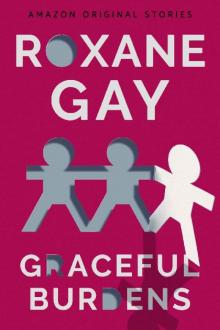 Graceful Burdens (Out of Line collection)
Graceful Burdens (Out of Line collection)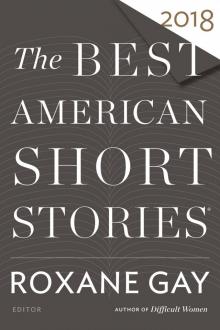 The Best American Short Stories 2018
The Best American Short Stories 2018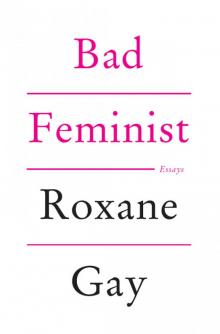 Bad Feminist
Bad Feminist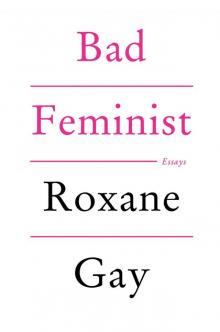 Bad Feminist: Essays
Bad Feminist: Essays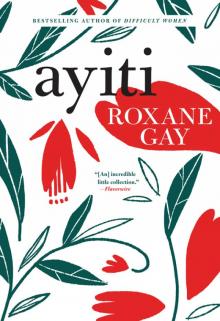 Ayiti
Ayiti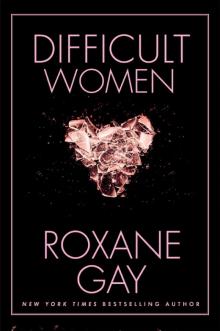 Difficult Women
Difficult Women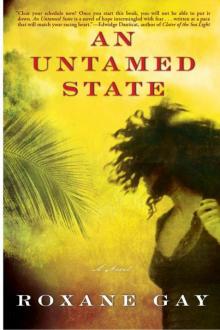 An Untamed State
An Untamed State Hunger
Hunger